As recent events brought policing matters at the centre of attention, the police abolition debate is getting stronger. But will this help improve public safety overall?
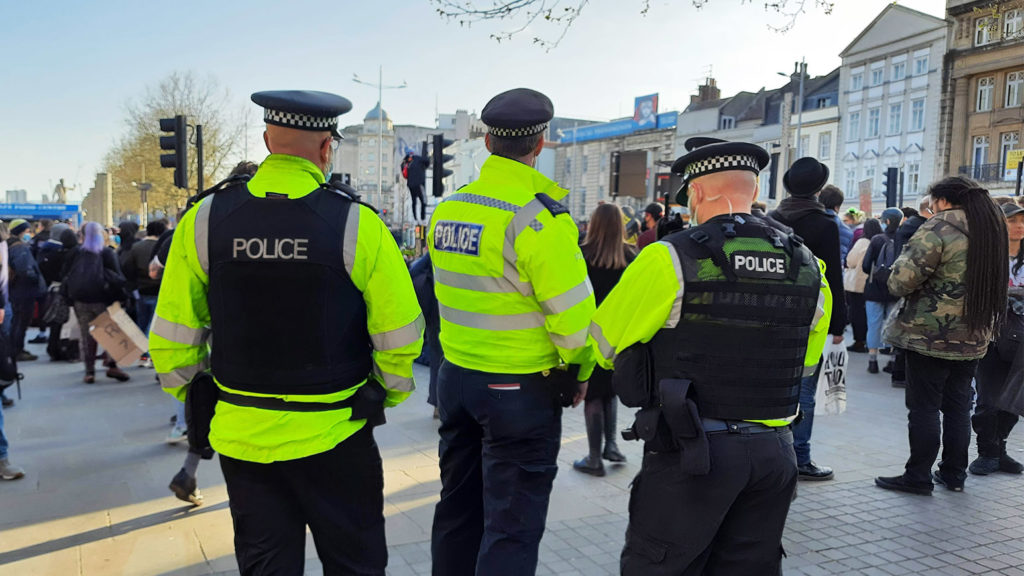
While the police officer involved in the killing of George Floyd was being charged for his death, another 15-year-girl was shot dead by the police in Ohio. A week before, it was the time of 13-year-old Adam Toledo. The list is really long and not limited to the US.
In January, it was the death of 24-year-old Mohamud Mohammed Hassan, after being released from Cardiff police custody, to remind the nation that policing problems are closer than many could think. Or the ongoing campaigns seeking justice for Christopher Kapessa and Siyanda Mngaza, two cases that highlight people’s anger against the current justice system.
StopWatch is an organisation formed in 2010 that seeks to promote effective, accountable and fair policing. Its team, composed by lawyers, policy experts and activists, is engaged in challenging the current order and informing the public about UK policing matters.
Habib Kadiri, research and policy manager at StopWatch, said that there is a natural antagonistic tendency into the current UK policing system. “The police abolition argument gained a lot more traction when you see things in that way,” he added.
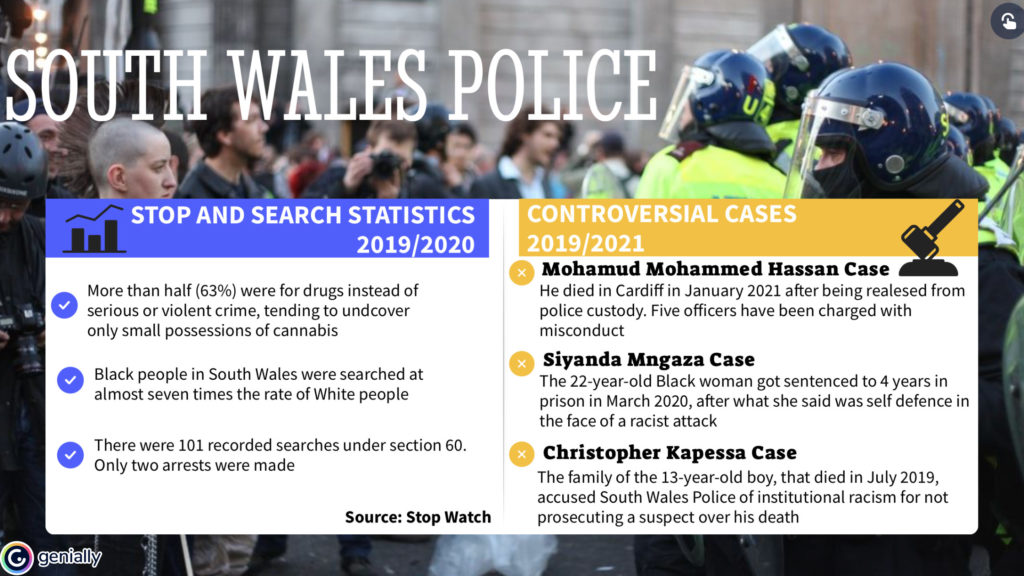
The UK has one of the largest policing budgets per capita in Europe, together with wide-reaching public surveillance measures. Although, as the BBC reported in 2019, the proportion of crimes solved by police in Wales and England had fallen to the lowest level recorded. Amongst these, only 7.8% of offences ended up with someone being charged.
Plus controversial regulations, such as the widening of Stop and Search powers under Section 60 or the more recent Police Bill, contribute to the increasing discontent amongst Britons.
Although, as a Black Lives Matter Cardiff activist said: “Policing is a global phenomenon, they all are repressive and awful techniques are actually spreading across the world. This is an international issue.”
The debate over defunding and ultimately abolishing the police is becoming more prominent. Therefore, it is worth taking a look at a world without a policing force as a feasible possibility.
Reforming vs. abolishing
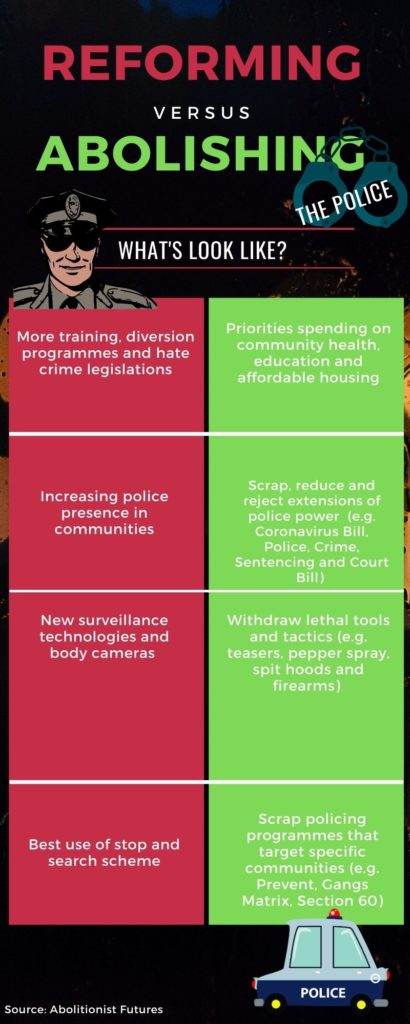
Reformists believe that the issue is on individuals and therefore can be solved with better reforms. While police abolitionists start from the concept that the whole system is broken.
As a Black Lives Matter Cardiff member said: “The main issue with the police is that they are the state’s army, and they protect the status quo. This isn’t a matter of the police is not working properly. The police is working quite fine. The police is working perfectly in the eyes of the state and the ruling class, but it’s not working for average people.”
As a police officer recently reminded in a tweet regarding the Kill the Bill Protest, UK police is technically serving the Crown and not the citizens.
“Power can be very hard to let go even if it seems unjustifiable for any logical or moral level,” said Habib from StopWatch, “That’s a real problem that we’re not sure how much reformed can be gathered from that to change police attitudes.”
As he explained, police abolition simply looks for different possibilities to deal with situations that could create grounds for criminality or an excessive use of force. “Once you start to see things in that way, it is probably easy to understand and sympathise with the argument,” he added.
Safety is the main object of concern for those who are in favour of reforming the police, and for those who are seeking alternatives. As the BLM Cardiff activist said: “I think the question that should be posed is, are the police making us feel safer right now? And that’s objectively no, they’re not.”
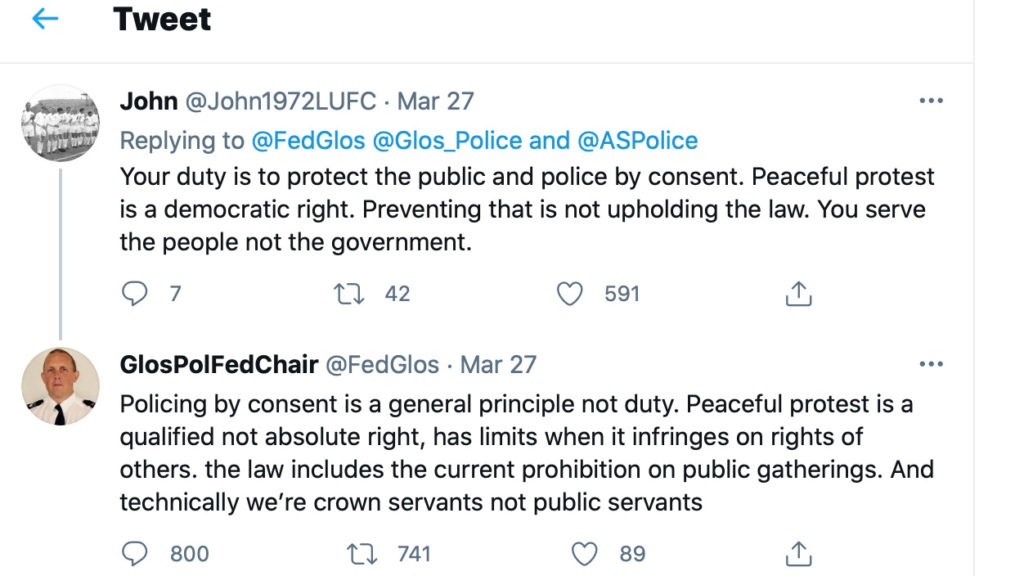
Defunding the police, reinvesting into the community
Police officers are now the first responders for many public issues that are not related to crimes. Mental health episodes, drug addiction, homelessness: these are issues that could be better solved by trained specialists, without police intervention.
“Police abolition would simply mean that police wouldn’t be there in the first place. It would be very much a last resort at best,” said Habib, “there are initiatives, especially for young people, that I think communities that already exist would like to fund. And the police would be the obvious place to divest money from.”
As the BLM Cardiff member pointed out, this could also lead to more democratic solutions of services reallocation. Communities would be then able to actively decide how to use their resources.
“There’s so many dilapidated buildings that can be restored and made as community centres or places where people can have workshops, or just learn and be creative. There’s so many options that we can do. But we just don’t, because the choices are not made by us. They’re made by very small groups of people. And they’re made for reasons that we don’t really agree on,” he added.
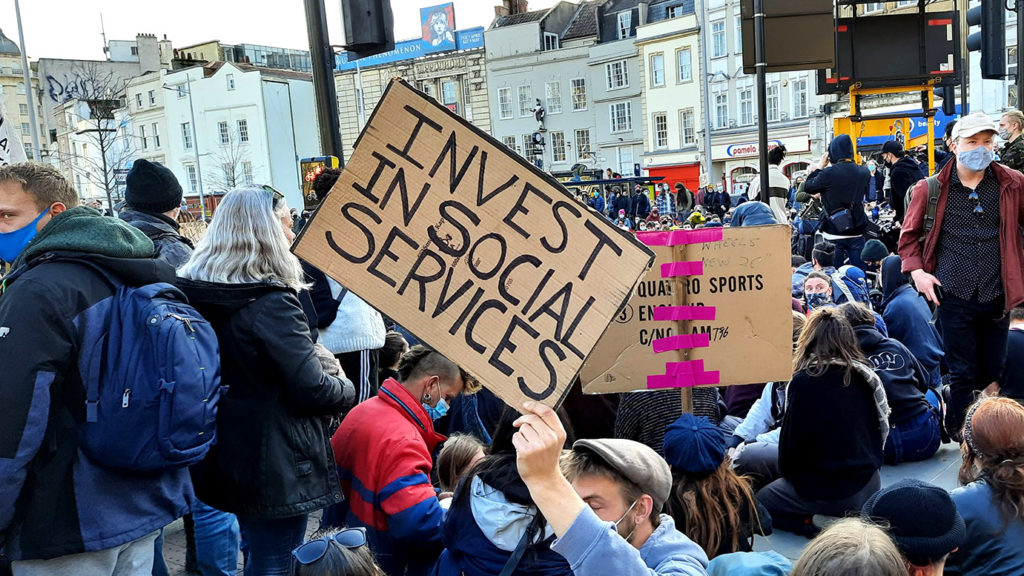
Preventing rather than punishing
Between 1993 and 2016, the number of prisoners have almost doubled across England and Wales. Although, as figures from the Ministry of Justice suggest, only in Wales around a third of those who have been convicted for offences go on to reoffend. This further supports the abolitionist argument that is looking to prevent those crimes, rather than punishment afterwards.
According to Habib from StopWatch, for achieving a crime-free society you first need to ask yourself were the crime comes from. “The way that a violent crime develops, it’s often a long time in the making,” he said, “by defunding the police more money could be pushed further upstream to organisations that might be able to change this person’s behaviour at any point.”
According to Unite, since 2012 more than 750 youth centres have closed across England and Wales. Community centres that could have had a positive impact on making more well-adjusted adults.
As the BLM Cardiff activist said: “We don’t need more police, we need more teachers, we need more artists, we need more writers. We need more people doing good, actually adding things to our society and protecting people.”

Even the idea of crime is something that from an abolitionist point of view needs to be reconsider.
“We don’t deny the existence of bad things happening, but we just don’t believe the police are a solution to it. And we don’t believe prisons are a solution to it, either,” said the BLM Cardiff member, “it’s not just the idea of crime, it is the idea of a criminal, of who actually are the real criminals.”
How to get there?
“I don’t think it’s instantly possible. It’s gonna be a very long, very hard fight,” said Habib. “We need to be able to keep pressing as well in ways that are outside of the central government.
“There is a whole coherent set of ideas on the agendas that are being discussed. There’s a generation of people who really buy into these ideas and really hope for change. And so, there’s good reason to see that there will be victories in the future.”
As BLM wrote in Voice.Wales, defunding the police is only the first step rather than the conclusion.
“I think once you defund the police, the logic and the utility of the police will become irrelevant,” said one of its members. “People’s ideas change in the struggle, there they start seeing things differently. You can see the chain in people’s ideas. And I think in Cardiff, it has changed quite considerably.”
